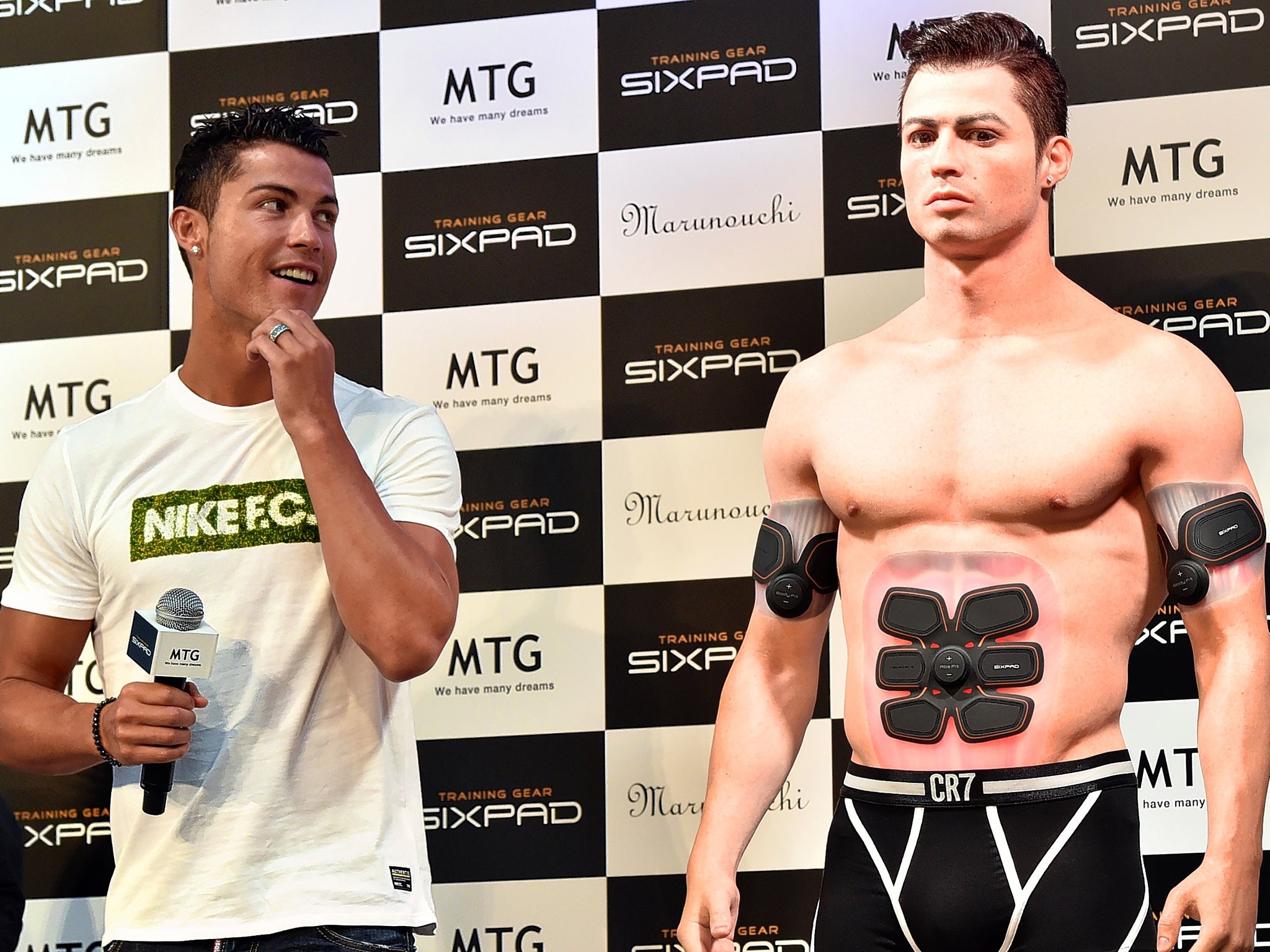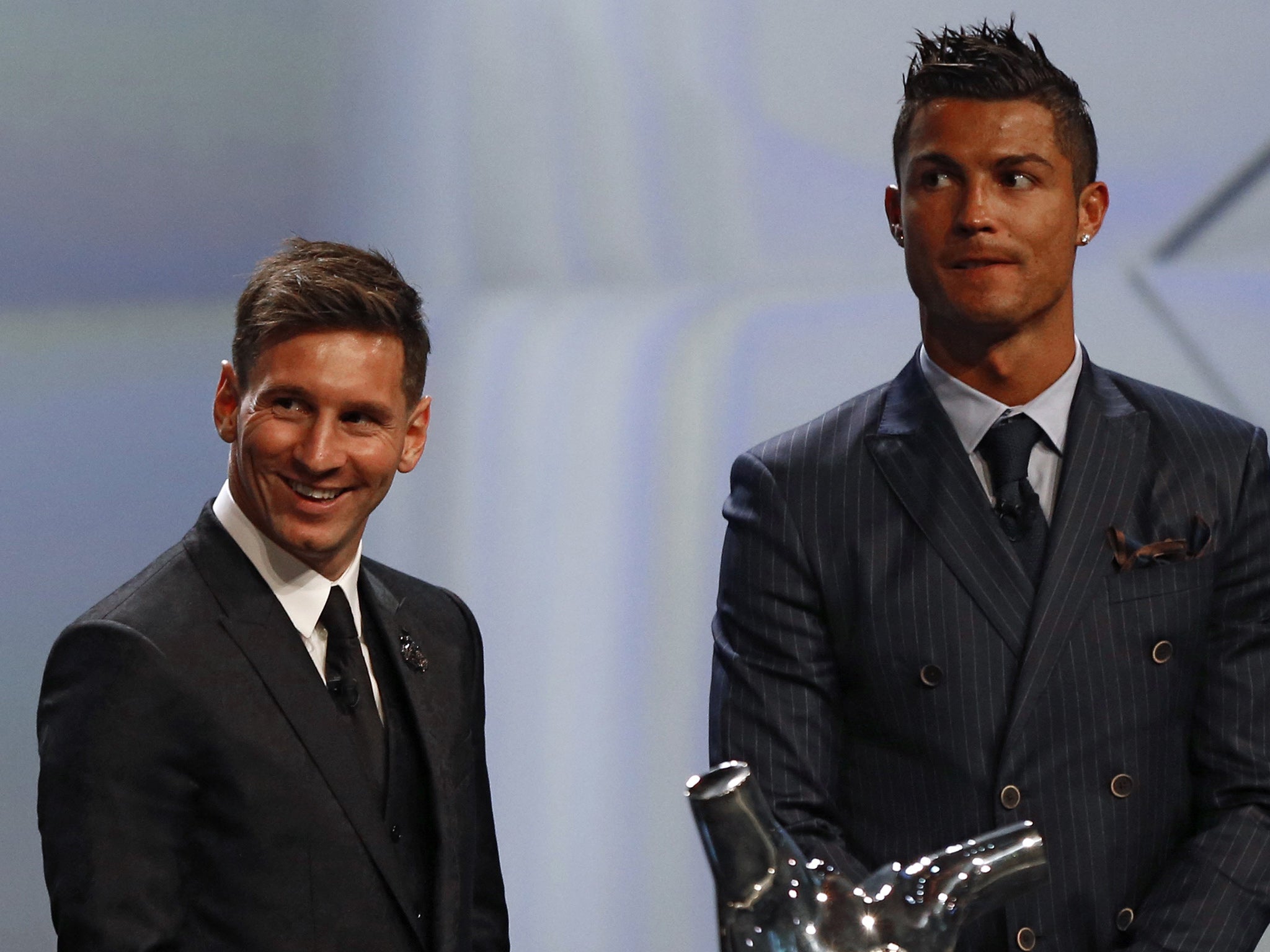The real Cristiano Ronaldo: from butt of Manchester United jokes to double Ballon d'Or winner
Forget the self-absorbed film out this week, a new unauthorised biography captures far better the striker’s journey

Your support helps us to tell the story
From reproductive rights to climate change to Big Tech, The Independent is on the ground when the story is developing. Whether it's investigating the financials of Elon Musk's pro-Trump PAC or producing our latest documentary, 'The A Word', which shines a light on the American women fighting for reproductive rights, we know how important it is to parse out the facts from the messaging.
At such a critical moment in US history, we need reporters on the ground. Your donation allows us to keep sending journalists to speak to both sides of the story.
The Independent is trusted by Americans across the entire political spectrum. And unlike many other quality news outlets, we choose not to lock Americans out of our reporting and analysis with paywalls. We believe quality journalism should be available to everyone, paid for by those who can afford it.
Your support makes all the difference.We have seen once before what Cristiano Ronaldo vanity projects can look like. There was a bizarre ghostwritten book, Moments, published when his Manchester United career had just taken hold in 2007, the early pages of which are consumed by his “fondness for advertising”, with stories and images from publicity shoots in Jakarta, Indonesia. He told why he enjoyed his first modelling experience with Pepe Jeans, “because I had to pose side by side with a professional model who was used to the cameras”. The book, he explained, was, “my image, reflected in the mirror of my soul”.
He does not seem to have learnt from experience, to judge by the new film, Ronaldo, an hour and 42 minutes of self-absorption devoted substantially to a love-in between CR7 and his agent, Jorge Mendes, of whom the player says, with utter lack of irony: “He is the best; the Cristiano Ronaldo of agents.”
The Spanish writer and journalist Guillem Balague certainly dodged a bullet when Mendes withdrew the promise that he and the player would collaborate on a new biography. This, Balague says, was because in his authorised autobiography of Lionel Messi, he cited unnamed Real Madrid players who claimed Ronaldo’s nickname for the Argentine was “motherf*****”. Real players who fraternised with Messi earned the same title, too. One short paragraph sent Ronaldo racing on to Facebook to threaten legal action, which never materialised.
Balague, who wonders whether the belated fury was Ronaldo drumming up support for his Ballon d’Or challenge at the time, set off without him, and has certainly demonstrated the supreme value of working unauthorised in the world of sport, where collaboration generally entails compromise. The merits of operating on the inside or outside are something Balague will discuss on Friday at the London Sports Writing Festival, the four-day event at Lord’s which opens the previous day, and the book certainly makes a case for the latter.
Instead of such source material as the hysterical girl who breaks a cordon to reach him at a training session during the last World Cup and the school run with Cristiano Jnr, which the film parades, we learn in new detail the story of Ronaldo’s development at United and are left with the sense that what former assistant manager Mike Phelan calls United’s “working-class philosophy” is something unmatched in his life since.
Balague relies on what Mendes has told others to relate the story of how the 18-year-old Ronaldo met Arsenal manager Arsène Wenger and loved his visit to the London Colney training ground in 2003, only for Arsenal’s stadium construction project to leave them a few million short. But Peter Kenyon’s £12m offer for United opened another route, of course, and it is the testimony of Gary and Phil Neville, Rio Ferdinand, Quinton Fortune, United fitness coach Mike Clegg and kitman Alec Wylie about the Carrington days with Ronaldo which provides the book’s richest seam.
The initiation ceremonies included thumping tackles, with reminders that he had never played in a World Cup and was merely keeping David Beckham’s seat warm. Fatally, he gave his tormentors a reaction. All that, in the days when he was consigned to what was known as the “championship box” for second-grade foreign squad members, while United’s legendary box or rondo training exercises took place. He was soon promoted to what was popularly known as the “millionaires’ box”, designated for Champions League players, where his dragbacks, back-heels, stepovers and dummies tempted Ryan Giggs, Paul Scholes and – after a fashion – Gary Neville to try the same. “He was having a sort of ‘Cantona effect’,” says the elder Neville. “If he can do it, we can too.”
It is not so much the story of Sir Alex Ferguson slaughtering him after an anaemic display against Benfica in December 2005 which fascinates – “cry baby” taunts flowed at Carrington in the ensuing weeks – as the effect this reaction had on Ferguson. Future dressing-downs were more measured and would be followed by the manager taking up a seat next to him: “Don’t take it badly but you need to know that English football is different…”

And the player visibly grew. Giggs was mildly miffed to hear from Clegg that Ronaldo was seeking more extra time with him than anyone else. Kitman Ian Buckingham was regularly offered £100 if he could repeat the player’s daily new trick (“Bucks, can you do this one?”). The defenders fretted that he insisted on wearing studs in training – for extra pace – when forwards and ball-players usually wear moulds. He was giving stick back, too. “You English pigs only speak one language,” he said, and, to news of another possession-based training session: “This is s***. Two-touch crap.” Yet the two-touch games between him and Ferdinand in the dressing room – both wearing sandals – were legendary. Ronaldo had a saying about limiting his defensive work to preserve his energy: “Too much water kills the plant.”
It is courtesy of some particularly revealing testimony from Ferdinand that the book imparts insight into the aftermath of “winkgate” – Ronaldo’s gesture after he had contributed to United team-mate Wayne Rooney’s dismissal for England against Portugal in the 2006 World Cup quarter-final. Ronaldo went looking for Ferdinand to mediate in the Gelsenkirchen dressing room, after Portugal had won on penalties, and the defender brokered a meeting there and then at which Rooney warned Ronaldo that the English fans’ fury would be the biggest problem. On the coach back to the hotel, Steven Gerrard told Rooney that if he had endured that against club-mates Xabi Alonso or Luis Garcia, he would never speak to them again.
There is also the story of Carrington’s only full-length mirror in the changing rooms being next to Ronaldo’s locker, though the idea that he engineered its presence there is apocryphal. And behind it all, there is a less closely observed sense of how this boy’s obsession with being the greatest player of his day took hold. The book charts his childhood on Madeira – clinging to the alcoholic father, Dinis, for as long as he could before the depression and drink, seemingly a form of post-traumatic stress sustained during army service in one of Portugal’s African colonies, kicked in.
A child born into his parents’ marital disintegration, he was unwanted and, Balague suggests, there was an attempted abortion by a mother who thought drinking boiled black beer would do the job. A doctor refused to help, seeing no reason for a termination. The boy was named after Ronald Reagan who – though the book doesn’t state it – is thought to have been his father’s favourite actor.
You sense, from the long prologue charting the breakdown of his relationship with Mendes, the frustration Balague feels at being cast out into the cold. But he is wise to the consequences. “Interviewing the subject in question does not guarantee access to the whole truth. It guarantees the subject’s truth,” he writes. Yes: this is a road best travelled alone.
Guillem Balague, author of ‘Cristiano Ronaldo The Biography’ (Orion Books, £20) will be discussing the player at the London Sports Writing Festival at Lord’s on Friday at 6.30pm. londonsportswritingfestival.com
Join our commenting forum
Join thought-provoking conversations, follow other Independent readers and see their replies
Comments